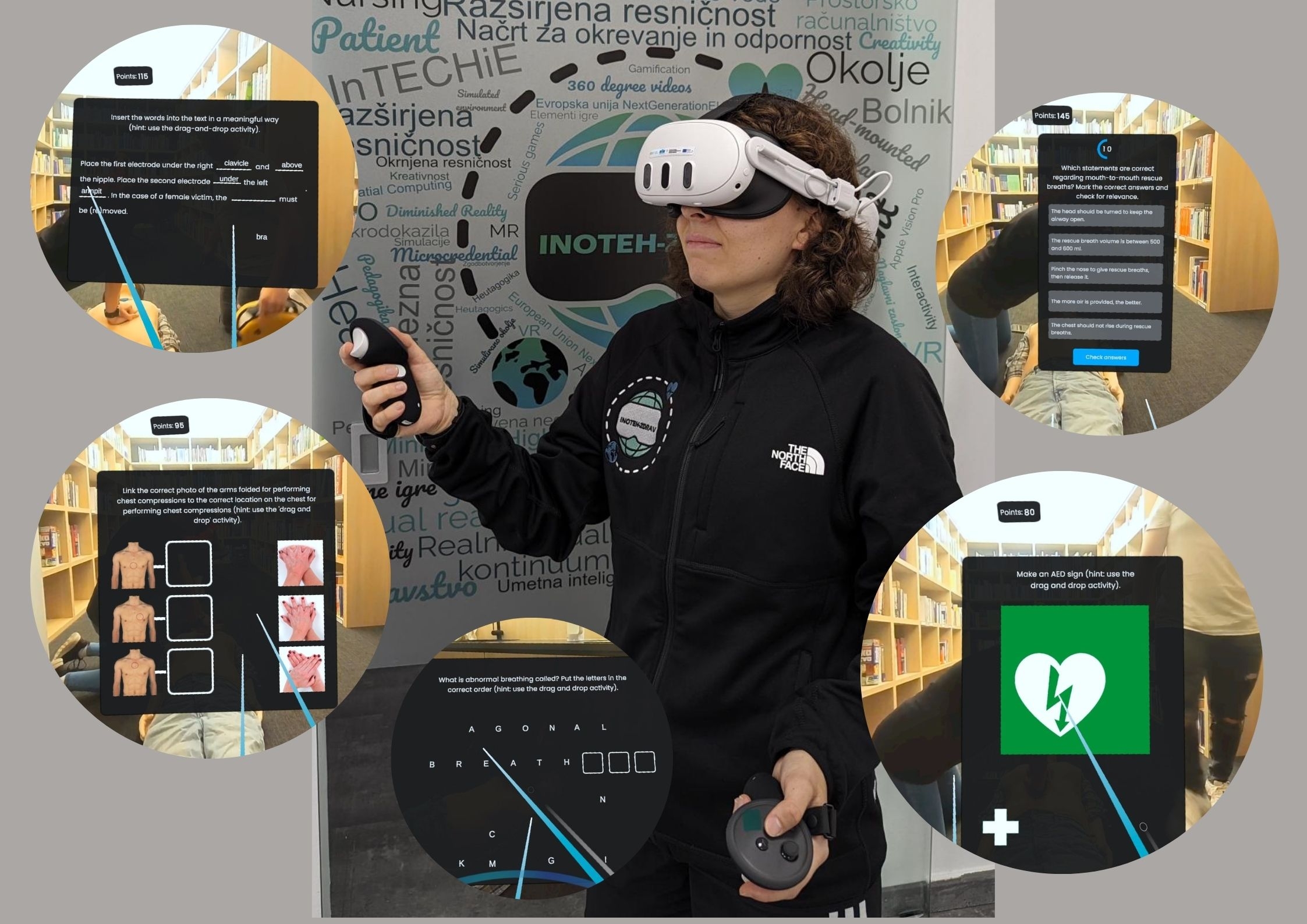Final ID: Su1105
Healthcare Students' Attitudes on Adult Basic Life Support Training via Virtual Reality: An Exploratory Study
Abstract Body: Introduction
Adult Basic Life Support (BLS) is a crucial skill for healthcare professionals. In recent years, the use of immersive technology, such as virtual reality (VR), has increased in educational research projects. However, published data have yet to show significant advantages over traditional methods for BLS education.
Research Question
Does providing adult BLS content through VR fit the new generation of healthcare students?
Goal
To assess student perspectives after a novel BLS educational program involving an interactive 360° VR environment.
Methods
In June 2024, the Faculty of Health Sciences at the University of Maribor (Maribor, Slovenia) hosted 24 healthcare students from the University of Pittsburgh (Pittsburgh, USA) for an interactive 360° video-based VR adult BLS training session. The training employed Meta Quest 3 headsets (California, USA), featuring an adult BLS scenario developed by the Faculty of Health Sciences at the University of Maribor called InTECHiE360. After the VR training, the students completed a 21-question Likert scale questionnaire to evaluate their experiences, with a rating of 1 indicating "totally agree", and a rating of 7 indicating "totally disagree". Prior to the study, participants provided written consent, and data were collected anonymously to ensure confidentiality.
Results
A total of 21 participants, with a mean age of 20 years (SD±0.7), took part in our study. The majority were female (17/21; 81%) and medical students (12/21; 57%). Most participants (16/21; 76%) had previously used VR, primarily for recreational gaming, rather than for educational purposes. The participants strongly agreed that the VR experience made them feel physically present in the adult BLS training session (mean score 1.9; SD±0.8), was realistic (mean score 2.0; SD±0.9) and provided a better learning experience compared to traditional lectures (mean score 1.5; SD±1.0). They also felt that they learned something new about adult BLS through the VR training (mean score 1.6; SD±1.1) and that adult BLS content was well presented in VR (mean score 1.4; SD±0.6). None of the participants experienced cybersickness, such as nausea or dizziness, and all of them would recommend this VR experience.
Conclusion
We developed an interactive, immersive, evidence-based educational tool with a low risk of cybersickness, designed to appeal to the current generation of healthcare students and enhance their cognitive, behavioral, and affective learning outcomes.
Adult Basic Life Support (BLS) is a crucial skill for healthcare professionals. In recent years, the use of immersive technology, such as virtual reality (VR), has increased in educational research projects. However, published data have yet to show significant advantages over traditional methods for BLS education.
Research Question
Does providing adult BLS content through VR fit the new generation of healthcare students?
Goal
To assess student perspectives after a novel BLS educational program involving an interactive 360° VR environment.
Methods
In June 2024, the Faculty of Health Sciences at the University of Maribor (Maribor, Slovenia) hosted 24 healthcare students from the University of Pittsburgh (Pittsburgh, USA) for an interactive 360° video-based VR adult BLS training session. The training employed Meta Quest 3 headsets (California, USA), featuring an adult BLS scenario developed by the Faculty of Health Sciences at the University of Maribor called InTECHiE360. After the VR training, the students completed a 21-question Likert scale questionnaire to evaluate their experiences, with a rating of 1 indicating "totally agree", and a rating of 7 indicating "totally disagree". Prior to the study, participants provided written consent, and data were collected anonymously to ensure confidentiality.
Results
A total of 21 participants, with a mean age of 20 years (SD±0.7), took part in our study. The majority were female (17/21; 81%) and medical students (12/21; 57%). Most participants (16/21; 76%) had previously used VR, primarily for recreational gaming, rather than for educational purposes. The participants strongly agreed that the VR experience made them feel physically present in the adult BLS training session (mean score 1.9; SD±0.8), was realistic (mean score 2.0; SD±0.9) and provided a better learning experience compared to traditional lectures (mean score 1.5; SD±1.0). They also felt that they learned something new about adult BLS through the VR training (mean score 1.6; SD±1.1) and that adult BLS content was well presented in VR (mean score 1.4; SD±0.6). None of the participants experienced cybersickness, such as nausea or dizziness, and all of them would recommend this VR experience.
Conclusion
We developed an interactive, immersive, evidence-based educational tool with a low risk of cybersickness, designed to appeal to the current generation of healthcare students and enhance their cognitive, behavioral, and affective learning outcomes.
More abstracts on this topic:
Assessment Of Medical Students' Knowledge Before And After Basic Life Support Training At A University In Southeast Pará
Bueno Claudia, Souza Barbara, Santos Aline, Da Silva Ferreira Laíse Jorrana, Varao Thawanny, Cunha Carneiro Maria Angelica, Gomes Laysa, Teixeira Costa Ana Carolina, Miranda Luana, Martin Joelma, Rocha Nathalia, Dias Adria
Adapting Chest Compressions to Variable Chest Dynamics in Out-of-Hospital CPRUriguen Jose Antonio, Leturiondo Mikel, Daya Mohamud, Russell James

